1. A male Hindu A dies as an undivided member of Mitakshara coparcenary in 2009, survived by his parents M and F, brother Br and Sis, one son S, and one daughter D. D has children... 1. A male Hindu A dies as an undivided member of Mitakshara coparcenary in 2009, survived by his parents M and F, brother Br and Sis, one son S, and one daughter D. D has children DD and DS and husband H. S has a wife SW and two children SS and SD. SS is married and has a wife SSW, a son SSS, and a daughter SSD. Determine the share of each member in the family. Would your answer be different if A died in 2000? Answer with relevant law and precedent. 2. A widow dies intestate leaving behind separate property worth 50 lakhs. She is survived by a daughter, a son, and a daughter of a predeceased son. Determine the share of each party in accordance with the Hindu Succession Act. 3. Anita marries Bimal according to Hindu rites, both parties being Hindus. A few years later, Bimal adopted a daughter under the HAMA. What are the prerequisites of such an adoption? The couple wish to adopt another daughter. Comment on the validity of such an adoption. Can the adoptive parents dispose of their properties through a testament after the adoption? Answer with the provisions of the HAMA. 4. Sunil and Reena got married. After a few years of marriage, Reena was abused physically and verbally. She approached a police station where a DIR was lodged. What orders can she get in her favor? Discuss with provisions of the Protection of Women from Domestic Violence Act. 5. Discuss divorce by mutual consent under the Hindu Marriage Act 1956. 6. Explain the objectives of the Family Court Act and jurisdiction of Family Courts.

Understand the Problem
The questions are primarily focused on legal principles under Hindu law, including inheritance, adoption, domestic violence, and divorce. They require detailed legal analyses and references to applicable laws.
Answer
Application of relevant Indian family laws to scenarios provided.
Answers to each question vary based on the specific provisions and amendments in Indian family law. Detailed analysis and application of the Hindu Succession Act, Hindu Adoptions and Maintenance Act, Protection of Women from Domestic Violence Act, and Hindu Marriage Act are essential.
Answer for screen readers
Answers to each question vary based on the specific provisions and amendments in Indian family law. Detailed analysis and application of the Hindu Succession Act, Hindu Adoptions and Maintenance Act, Protection of Women from Domestic Violence Act, and Hindu Marriage Act are essential.
More Information
Laws related to family inheritance, adoption, protection from domestic violence, and divorce by mutual consent are implemented through detailed statutory provisions, ensuring rights and justice to individuals based on specific personal law guidelines.
Tips
Ensure to reference the correct amendment years and apply the statutes accurately to the presented scenarios.
Sources
- Hindu Succession Act, 1956 - ncwapps.nic.in
- Protection of Women from Domestic Violence Act, 2005 - wcd.nic.in
- Hindu Adoptions and Maintenance Act, 1956 - indiacode.nic.in
AI-generated content may contain errors. Please verify critical information